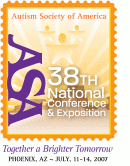 |
The ASA's 38th National Conference on Autism Spectrum Disorders (July 11-14, 2007) of ASAThe Westin Kierland Resort & Spa, Scottsdale, AZ |
| For a complete author index with session numbers, please click here | |
| Saturday, July 14, 2007: 10:00 AM-11:15 AM | |||
| Rainmakers Ballroom C | |||
| #2796- It Takes an ONLINE Village to Raise a Child with Autism* | |||
| Online resources for autism are everywhere, yet finding consistent support for parents, extended family, and professionals for simple, daily questions is difficult. In 75 minutes we will help parents and professionals understand the importance of and learn how to connect through online communities. Online autism spectrum disorders communities connect families, school professionals, therapists, authors and researchers in an informal environment where they can ask questions and get practical answers. | |||
| Presenters: | - Eric Blackwell is father of four (two on the autism spectrum) and co-founder of AutismNotes.com, a no-cost online community dedicated to creating a positive place to exchange practical ideas as well as providing uplifting support for anyone affected by ASD. The Blackwells presented previously at ASA and NATTAP conferences.
- Jen Blackwell earned her degree in education and taught students with severe emotional handicaps. Four children and two spectrum diagnoses later, she returned to work with special-needs children. Jen is co-founder of AutismNotes.com as well as co-moderator of the AutismNotes Forum. The Blackwells presented previously at both ASA and NATTAP conferences. | ||
|
| |||
|
Introduction: Why Do We Need an ONLINE Village to Raise a Child with Autism? With neurotypical children, parenting advice typically comes from parents, extended family, teachers and other local influences. These village “leaders” draw from their own parenting and professional knowledge in order to provide the day-to-day practical advice needed to be successful. However, when a child with autism spectrum disorders (ASD) enters a family, there is seldom the experience within the family needed to guide the parents and other family members. Therefore, issues arise almost constantly from early childhood through adulthood that require outside support and assistance. Similarly, when child with ASD enters a classroom, educators need practical solutions to their “What do I do when …” questions. Whether they come from a professional or from a parent, these questions need answers and their concerns need support and encouragement. The necessary support and advice is available; oftentimes another member of the autism community will have been down the same road and will be able to provide assistance. However, even though the information exists, it is often not readily accessible. That is, many parents do not know from whom they can access information or just share joys and concerns. Online Autism Resources Are Plentiful One of the first things many parents of a newly diagnosed child do is search the Internet. They have questions and concerns and want to know what they can do to help their child. Rather than finding immediate answers, what they find when they search is overwhelming as the list of autism spectrum-related sites is unending. Many of these resources serve a valid role. What they are often NOT able to do is answer a teacher's question of “How should I react when my student with autism does (insert action here)?” Likewise, a parent who is upset about an issue at school asks, “How can I effectively deal with (insert IEP issue)? Finally, therapists and researchers are frustrated because they see so many children whose needs are not being recognized and served, often because the parents do not know how to find the professionals and they do not know the questions to ask. Enter the Online Community (or Village) The Internet is becoming a fully interactive media. This means that with convenient tools like BLOGS, FORUMS, DIRECTORIES and LIST Servers, a question that is asked by one person in a public forum in an informal way can benefit hundreds and even thousands of others who have the same or similar questions. Using this approach, the “village” of a child with autism is expanded to those who truly have the experience as “village elders” who are more readily available to the neurotypical children. As a Parent or Professional How Do I Join an Online “Community”? Joining a forum is simple. This session will provide examples from several different forums (including AutismNotes.com). In addition, how to “search” for answers, what proper online etiquette is, and the proper ways for therapists, consultants and others to effectively connect with families in this online environment will be demonstrated. Protecting and Respecting Privacy in an Online Environment Parents of children with ASD face special challenges of both being open and straightforward in advocating for their child, but at the same time they must safeguard and protect their privacy online. Similarly, educators need to be able to ask direct questions about with students with ASD, while protecting the identity of the individual child. The presenters will highlight several examples of what to do (and not to do!) in phrasing online conversations in a way that protects privacy, but also provides enough information for other community members to be able to assist. Finally, session attendees will learn how professionals can access online communities to keep abreast of current trends in concerns and also to get their “message” out to larger audiences. Summary Online communities are important resources to parents, extended family, educators, therapists and other professionals by offering the opportunity to connect ALL members of the autism community. This session will provide a hands-on introduction to resources on the Internet that provide this type of access to the autism community. As a result of attending this session, attendees will be better able to connect and communicate efficiently over the Internet.
|
|||
See more of General Submissions
See more of The ASA's 38th National Conference on Autism Spectrum Disorders (July 11-14, 2007)